The HYDRUS Software Package for Simulating
the Two- and Three-Dimensional Movement
of Water, Heat, and Multiple Solutes
in Variably-Saturated Media
Technical Manual
Version 1.0
March 2006
PC Progress, Prague, Czech Republic
�
�
The HYDRUS Software Package for Simulating
the Two- and Three-Dimensional Movement
of Water, Heat, and Multiple Solutes
in Variably-Saturated Media
Technical Manual
Version 1.0
J. Šimůnek1, M. Th. van Genuchten2 and M. Šejna3
March 2006
1University of California Riverside, Riverside, CA
2George E. Brown, Jr., Salinity Laboratory, Riverside, CA
3PC Progress, Prague, Czech Republic
�
ii
�
DISCLAIMER
This report documents version 1.0 of HYDRUS, a software package for simulating water, heat and
solute movement in two- and three-dimensional variably saturated media. The software has been
verified against a large number of test cases. However, no warranty is given that the program is
completely error-free. If you do encounter problems with the code, find errors, or have suggestions
for improvement, please contact one of the authors at
Tel. 1-951-827-7854 (J. Šimůnek)
Tel. 1-951-369-4846 (M. Th. van Genuchten)
Tel. +420-222-514-225 (M. Šejna)
Fax. 1-951-787-3993
E-mail Jiri.Simunek@ucr.edu
rvang@ussl.ars.usda.gov
mireks@pc-progress.cz
iii
�
iv
�
ABSTRACT
Šimůnek, J., M. Th. van Genuchten, and M. Šejna, The HYDRUS Software Package for Simulating
Two- and Three Dimensional Movement of Water, Heat, and Multiple Solutes in Variably-Saturated
Media, Version 1.0, PC Progress, Prague, Czech Republic, 2006.
This report documents version 1.0 of HYDRUS, a general software package for simulating
water, heat, and solute movement in two- and three- dimensional variably saturated media. The
software package consists of the computation computer program, and the interactive graphics-based
user interface. The HYDRUS program numerically solves the Richards equation for saturated-
unsaturated water flow and the convection-dispersion equation for heat and solute transport. The
flow equation incorporates a sink term to account for water uptake by plant roots. The heat transport
equation considers transport due to conduction and convection with flowing water. The solute
transport equations consider convective-dispersive transport in the liquid phase, as well as diffusion
in the gaseous phase. The transport equations also include provisions for nonlinear nonequilibrium
reactions between the solid and liquid phases, linear equilibrium reactions between the liquid and
gaseous phases, zero-order production, and two first-order degradation reactions: one which is
independent of other solutes, and one which provides the coupling between solutes involved in
sequential first-order decay reactions. In addition, physical nonequilibrium solute transport can be
accounted for by assuming a two-region, dual-porosity type formulation which partitions the liquid
phase into mobile and immobile regions. Attachment/detachment theory, including the filtration
theory, is included to simulate transport of viruses, colloids, and/or bacteria. The program may be
used to analyze water and solute movement in unsaturated, partially saturated, or fully saturated
porous media. HYDRUS can handle flow regions delineated by irregular boundaries. The flow
region itself may be composed of nonuniform soils having an arbitrary degree of local anisotropy.
Flow and transport can occur in the vertical plane, the horizontal plane, a three-dimensional region
exhibiting radial symmetry about the vertical axis, or fully three-dimensional domain. The water
flow part of the model can deal with prescribed head and flux boundaries, boundaries controlled by
atmospheric conditions, free drainage boundary conditions, as well as a simplified representation of
nodal drains using results of electric analog experiments. The two-dimensional part of this program
also includes a Marquardt-Levenberg type parameter optimization algorithm for inverse estimation
of soil hydraulic and/or solute transport and reaction parameters from measured transient or steady-
state flow and/or transport data for two dimensional problems.
v
�
The governing flow and transport equations are solved numerically using Galerkin-type
linear finite element schemes. Depending upon the size of the problem, the matrix equations
resulting from discretization of the governing equations are solved using either Gaussian elimination
for banded matrices, or a conjugate gradient method for symmetric matrices and the ORTHOMIN
method for asymmetric matrices.
The program is distributed by means of several different options (Levels). Levels 2D-Light
and 2D-Standard are for the programs and the graphical interface for two-dimensional problems
with either a structured mesh generator for relatively simple flow domain geometries or a CAD
program for more general domain geometries, and the MESHGEN2D mesh generator for an
unstructured finite element mesh specifically designed for variably-saturated subsurface flow
transport problems, respectively. Levels 3D-Light and 3D-Standard include the two dimensional
version and additionally the three dimensional versions for simple hexagonal or more general
layered geometries, respectively.
This report serves as both a technical manual and reference document. Detailed instructions
are given for data input preparation. The graphical user interface (GUI) of the Hydrus software
package is documented in a separate user manual (Šimůnek et al., 2006).
vi
�
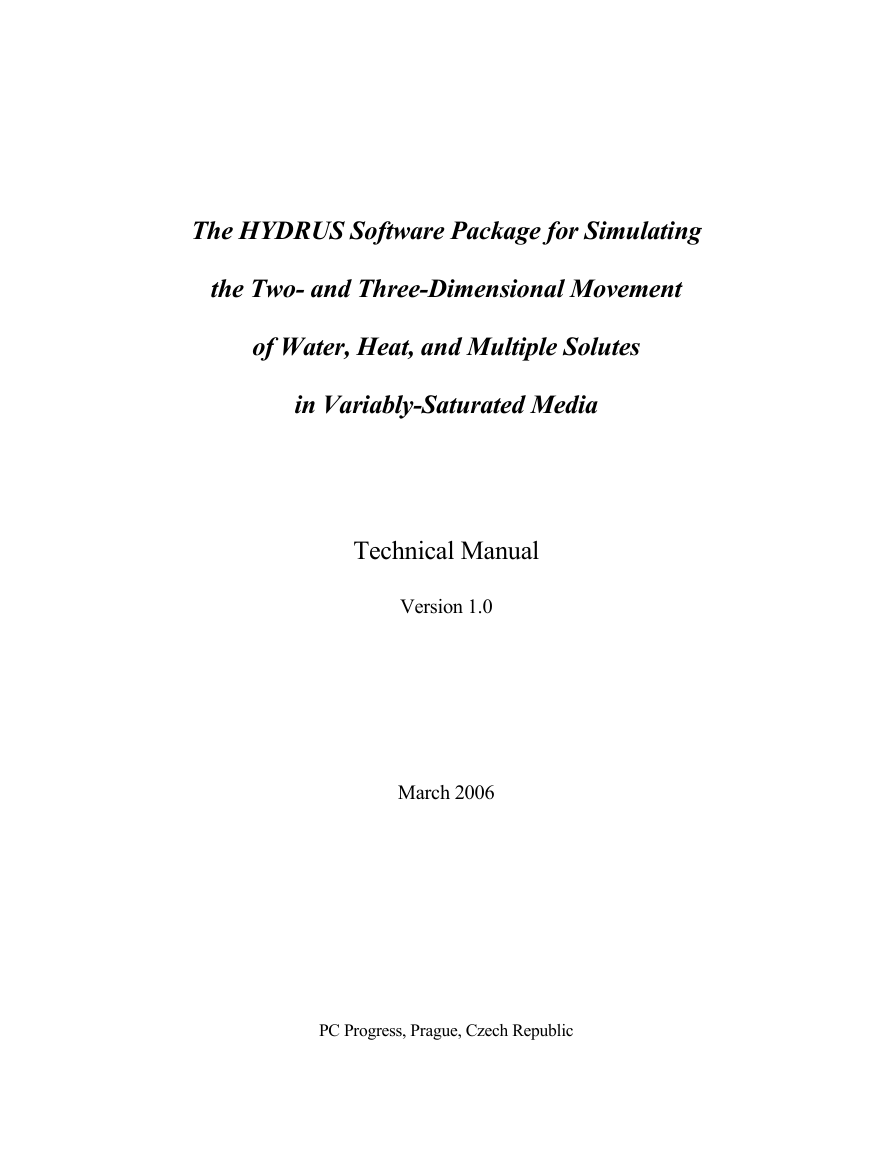

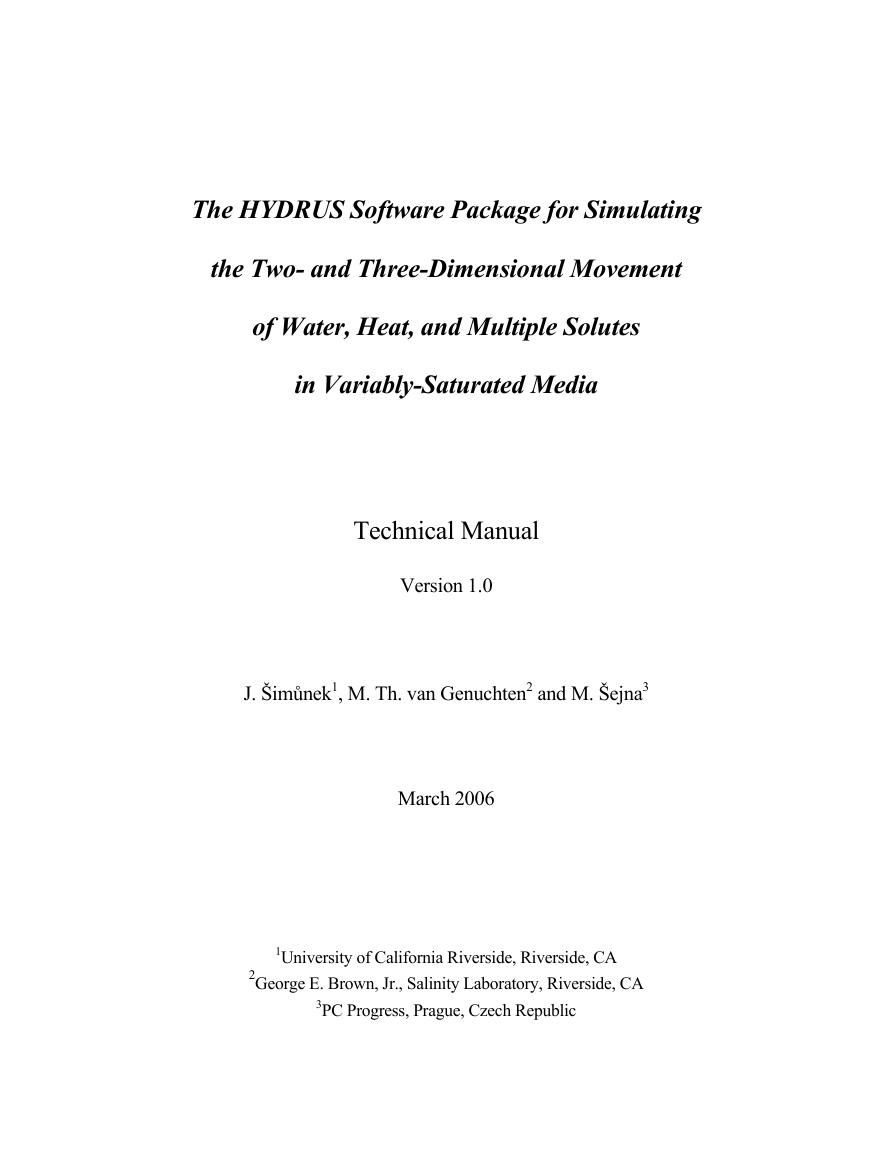

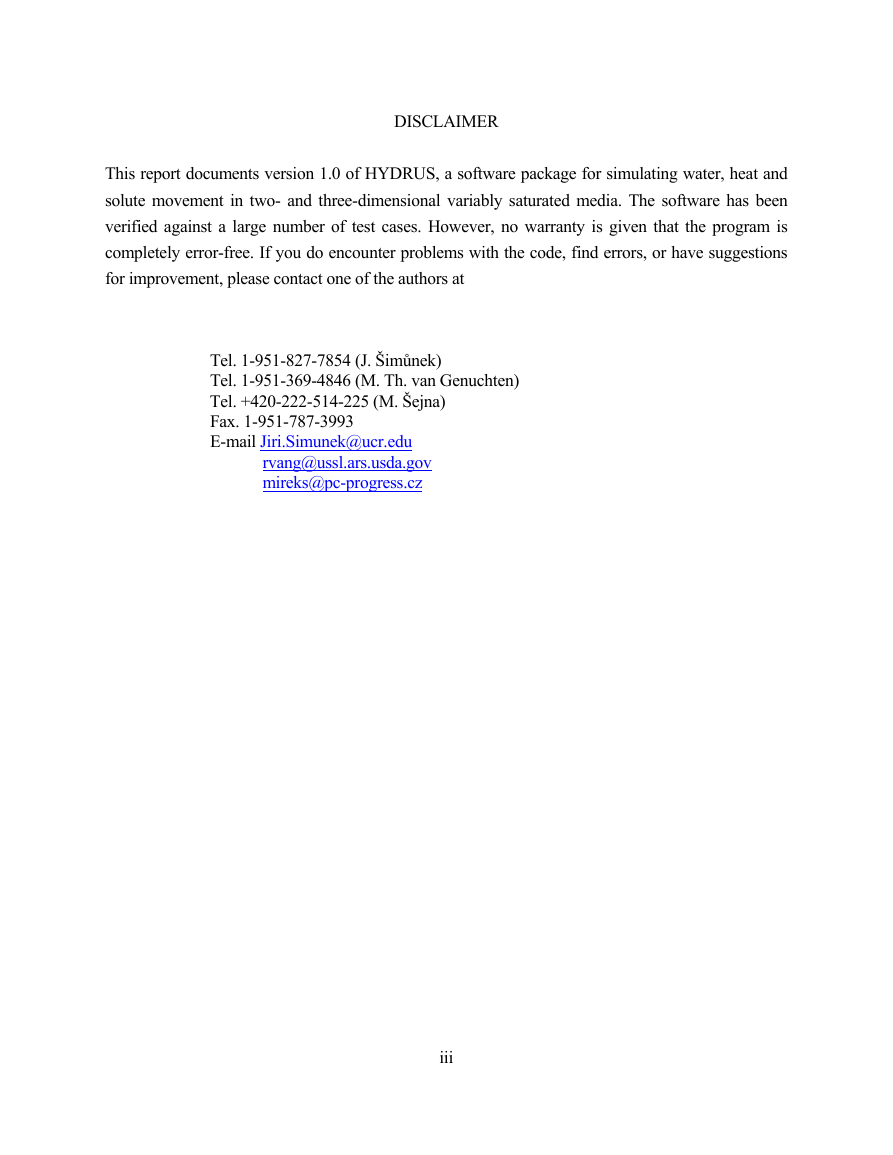

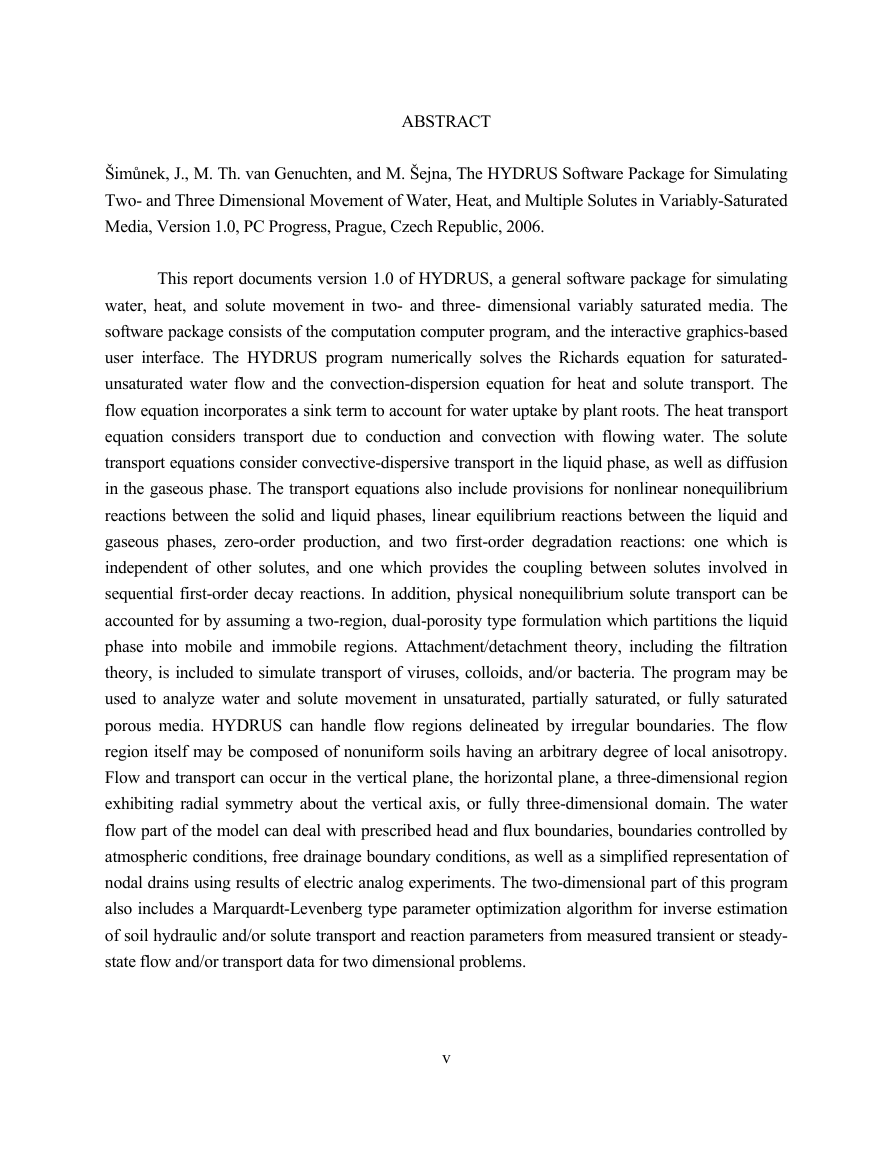
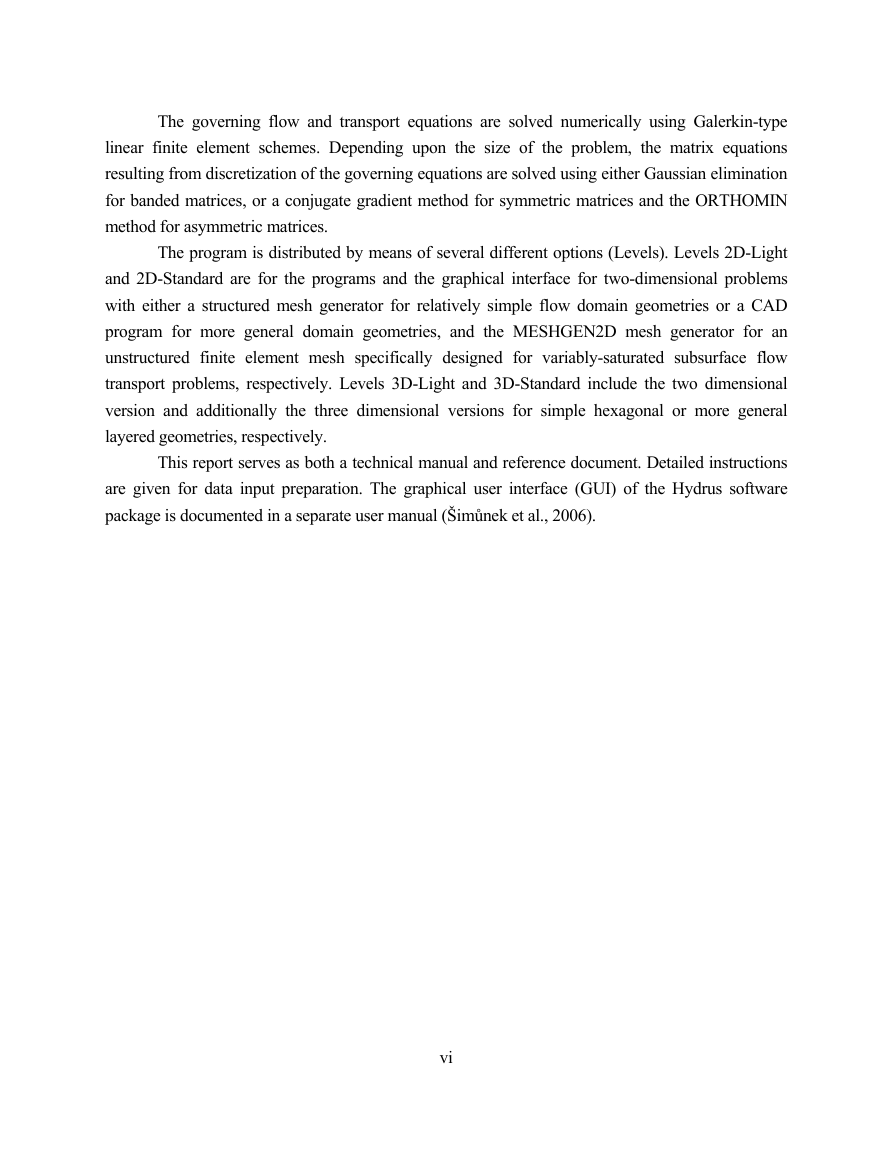








 2023年江西萍乡中考道德与法治真题及答案.doc
2023年江西萍乡中考道德与法治真题及答案.doc 2012年重庆南川中考生物真题及答案.doc
2012年重庆南川中考生物真题及答案.doc 2013年江西师范大学地理学综合及文艺理论基础考研真题.doc
2013年江西师范大学地理学综合及文艺理论基础考研真题.doc 2020年四川甘孜小升初语文真题及答案I卷.doc
2020年四川甘孜小升初语文真题及答案I卷.doc 2020年注册岩土工程师专业基础考试真题及答案.doc
2020年注册岩土工程师专业基础考试真题及答案.doc 2023-2024学年福建省厦门市九年级上学期数学月考试题及答案.doc
2023-2024学年福建省厦门市九年级上学期数学月考试题及答案.doc 2021-2022学年辽宁省沈阳市大东区九年级上学期语文期末试题及答案.doc
2021-2022学年辽宁省沈阳市大东区九年级上学期语文期末试题及答案.doc 2022-2023学年北京东城区初三第一学期物理期末试卷及答案.doc
2022-2023学年北京东城区初三第一学期物理期末试卷及答案.doc 2018上半年江西教师资格初中地理学科知识与教学能力真题及答案.doc
2018上半年江西教师资格初中地理学科知识与教学能力真题及答案.doc 2012年河北国家公务员申论考试真题及答案-省级.doc
2012年河北国家公务员申论考试真题及答案-省级.doc 2020-2021学年江苏省扬州市江都区邵樊片九年级上学期数学第一次质量检测试题及答案.doc
2020-2021学年江苏省扬州市江都区邵樊片九年级上学期数学第一次质量检测试题及答案.doc 2022下半年黑龙江教师资格证中学综合素质真题及答案.doc
2022下半年黑龙江教师资格证中学综合素质真题及答案.doc